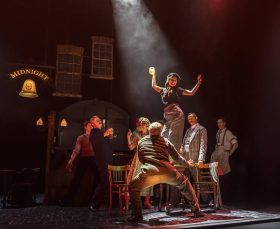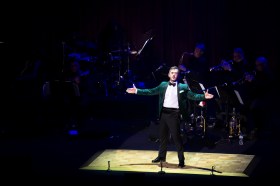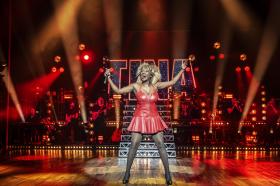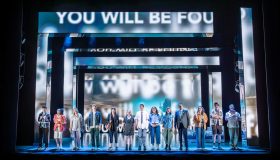Nancy Mauro-Flude, aka Sister O, is a multimedia phenomenon and feminist performance artist who combines digital technology with postmodernist philosophy and a punk sensibility. Born in Australia she originally trained in contemporary dance, and attended the DasArts academy in Amsterdam, where she is now based, although she is constantly in movement throughout cyber-, linear and geographical space. She is a writer, activist, performer, director, painter, singer, musician, meme-hacker and deconstructivist, among other things. She has frequently collaborated with the writer and performer Linda Dement, whom she lists among her influences.
What do you do all day?
Ideally, you mean? Do yoga, do some writing and tweaking. Go over a few parts of whatever project I have going. Documentation is always a neverending task. The list is too long.
What will you do today/ What have you done today?
I went for a swim because I am currently in Australia trying to take a little break. Then I spent most of the day organising my travel itinerary for early September, since I do a little UK and NL Tour for my new project Paraphernalia. Among other places it’s showing in UK at “(re)Actor2: The Second International Conference on Digital Live Art: Bad Girls, Gadgets and Guerrilla Performance” at Leeds Met University.
What’s your working process?
I usually just start playing wasting a lot of time: writing notes, reading, listening and watching material on the subject, drinking, dreaming and aimless wandering, until an outsider with more experience points out the fundamentals to me and then I try to streamline, refine and absorb information whilst continuing on in my own idiosyncratic experiential manner.
What’s the best thing about what you do?
I am enchanted when I look inside machines and humans, I like to touch their inner parts. I guess this stems from my childhood, as when someone would turn the T.V off I’d run to see if I could catch the people leaving from behind, curious and mystified. According to Baudelaire
(1853) ‘This is the first metaphysical tendency’, who in the Philosophy of Toys suggests ‘In their games children give evidence of their great capacity for abstraction and their high imaginative power.’ I come from a cultural tradition where personal creative practice is done for the eventual benefit of society to maintain the prosperity and health of all of the people, not just the atomised individual artist or movement, so it is mainly in meaningful collaborative contexts I find such acts profoundly thrilling.
And the worst thing?
Same…
How did you get into it?
As a child I constantly stared at my grandmother’s wall while she
sat endlessly sewing sequins for my dance Eistedfords. On this wall was a framed 1877 newspaper clipping of my great-great grandmother Professor Allan, ‘The Celebrated Magician of the Age’ who performed ‘the most wonderful ‘SLEIGHT – OF – HAND TRICKS’ coupled with step-dance, vaudevillian routines. Until I was told otherwise I thought that
performance was a natural part of life.
What’s been the biggest achievement in your career so far?
I don’t really get into the word achievement — too market orientated — but my most satisfying experience in performing arts was being approached by Director Edit Kaldor, who wanted to make a solo theatre piece called “DRAMA”. We wrote it together and he has a great sense of theatre craftsmanship which I find is rare. We are still working on the next stage of it, and will premiere it in about 6 months.
Where do you go from here, career-wise?
An image comes to mind. On these desolate shores where the shipwreck of digital media has cast us, I would like to pick up pieces of the wreckage and play with them, at least until I find the wand of Cinderella the fairy godmother…
Have you got any advice for someone trying to do what you do?
Keep on learning about the tools you are working with and developing
your craft. This never ends. If you don’t feel like it chose you, have a
think about why you are doing what you are doing.
When you were a kid, what did you want to be when you grew up?
I’ve been performing since I could walk. I just saw the continuation of that.
And if you were going to have a complete career change, what would you go for?
Osteopath.
Where do you look for inspiration?
To people with free spirits, courage, passion and integrity.
Which other artists do you look [up] to?
Valeska Gert, Edit Kaldor, Linda Dement, Patti Smith.
What constitutes a successful work, for you?
The artist who crafts their work with a bricolage type approach and has the power to create radically different cultural productions; works that are truly transgressive – work that transforms rather than simply seduces.
What constitutes an unsuccessful work?
A work full of surfaces that in an unreflexive manner recreates stereotypes, the unnecessary use of technology, and the use of the 4th Wall. The act of rationalizing one’s practice reduces its potential and negates the legacy of many people’s struggle to maintain this validity, which more adequately speaks of human form that is ephemeral, not concrete, and never quite what we think, to create the illusion of a life beyond the reality of the audience.




